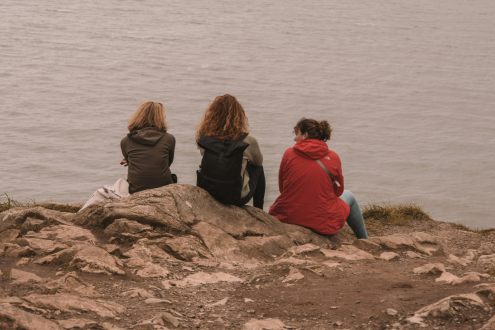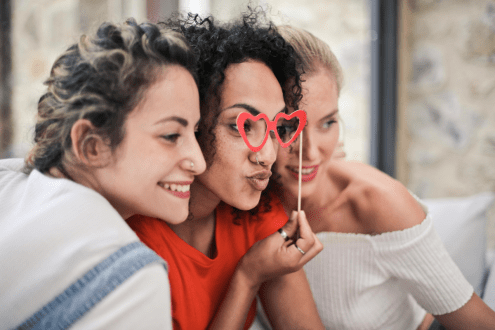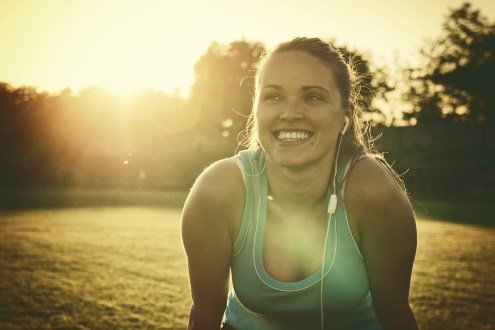‘You’ve got a friend in me…’: How to comfort a distressed loved one
The way we react to a loved one's distress can have a profound effect on their mood and ability to cope and, when your own emotional load feels overwhelming, turning to someone you trust can bring you back to a place of control
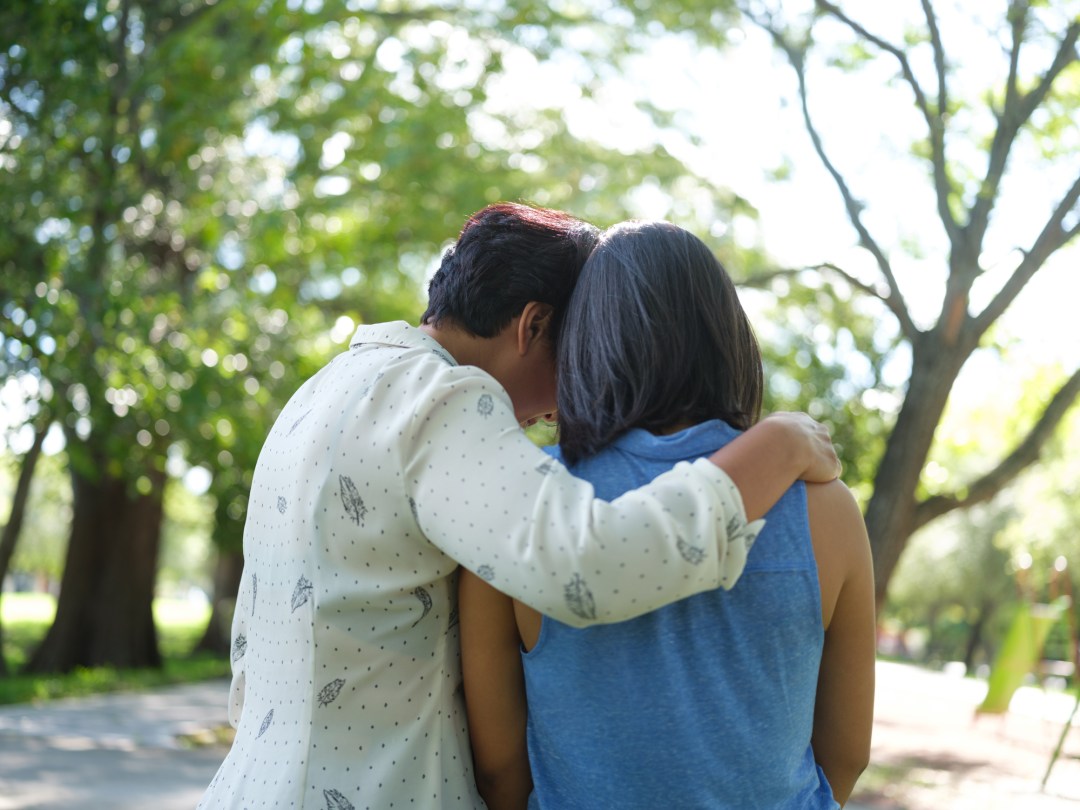
Whether it’s a spark of attraction when you meet someone for the first time or the recognition that you’ve found that most precious of assets, a new friend, you will notice not only how someone looks and what they say, but how they make you feel.
Beyond the usual social dance of two human beings getting to know each other, there is another introduction occurring: the meeting of two nervous systems. Now experts are beginning to believe that it is how this interaction plays out, rather than your relative intellects or the hobbies you may have in common, that will dictate how you feel in that person’s presence. This interplay – between your nervous system and someone else’s – is called co-regulation.
But we are not just passengers in this ride. Experts say that through touch, tone of voice and eye contact, we are able to influence and change the emotional state of another person – bringing them from panic to calm, or raising their energy, by changing our own.
Understanding how this system of co-regulation works is a powerful gift. It means that although you may not be able to wave a magic wand over a loved one’s crisis and make it go away, your behaviour in the moment can have a profoundly positive effect on their mood, and empowers you to offer friends in distress more than just a listening ear.
What is co-regulation?
Co-regulation is a neurological and biological phenomenon that occurs when two or more brains interact and fall in sync. Put a little more simply, it’s the scientific term recognising that your interaction with another person can influence their thoughts and feelings.
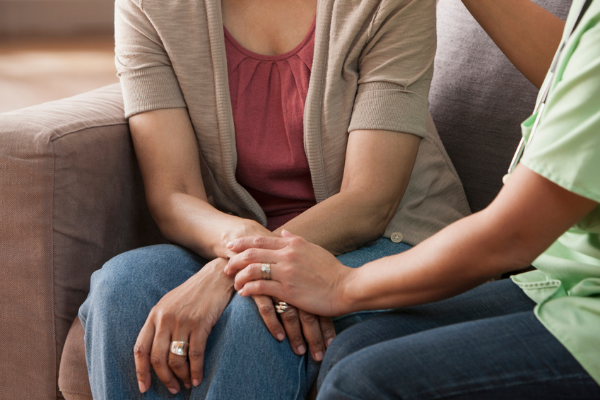
According to the cognitive neuroscientist Caroline Leaf, the author of Cleaning Up Your Mental Mess (Baker, £10.99), there are recognised neurobiological effects of co-regulating that result in the generation of a healing wave through the brain and body. Gene activity in the part of the brain that is involved in emotional perceptions, the amygdala, is altered, which elicits a positive response in the person being co-regulated.
Our earliest experiences of co-regulation come in infancy, when we do not have the ability to regulate our own emotions and need the soothing presence of a parent or carer to help us manage fear, frustration and anger. Soft voices, warm physical contact and generally having our physical needs met provide a practical model, teaching us how to self-regulate. But, although we learn to manage our emotions and practise self-control in childhood, there will be times in our lives when we struggle to self-regulate because our emotional load has become too heavy.
There are likely to have been moments of distress in your life when you have not been able to calm yourself down and have reached out to a friend or a relative for help, or when a loved one has turned up at your door, unable to manage their own emotions in trying circumstances.
Unity is strength
Human beings are social creatures, we are not meant to exist in isolation and need connection with others. When a friend calls upon you in a moment of trauma, flooded by emotion, your impulse may be to problem-solve and fix the issue for them. We want to be able to offer immediate relief by tackling the root of the pain or distress. But it is our power to provide calm that is key. More often than not, what is needed is for us to regulate the other person’s emotions and de-escalate the situation.
According to Razia Sahi, a graduate doctorate researcher at the University of California, we are better off coming together than trying to manage distress alone. ‘It can be hard to change our perspective of negative events that are getting us down,’ says Sahi. ‘But getting a friend’s perspective can help us change how we see those events and how we feel about them. My work suggests that leaning in to our close relationships during times of need can make a significant difference when we’re having a hard time coping on our own.’

You may have a friend who is so caught up in a negative cycle of thinking that they are beyond being able to think rationally. At that moment, another, more grounded and reasoned perspective is important.
Lay the foundations for co-regulation
The success of co-regulation relies on trust, according to Amira Johnson, a mental health expert and clinician at Berman Psychotherapy in Georgia in the United States. She says: ‘In those moments when self-regulation (the ability to manage one’s own emotions and behaviour in response to a thought, feeling or situation) is completely and utterly difficult, the act of co-regulating with a partner or loved one can be of great benefit.’ Two important aspects of relationship-building, according to Johnson, are vulnerability and trust, and when those key components exist, the foundations for co-regulation to be successful are in place.
Faith in friends
Johnson believes that being able to be truly present for someone means earning their trust. This can explain why some people are better equipped to comfort us than others. If you cannot completely trust someone not to judge you or to divulge your problem to others, then you will not expose the extent of your vulnerability to them. Often the individuals we open up to are family or close friends, people who we have learned to trust, but sometimes a gut feeling about someone means you may be drawn to confide in them, despite not knowing them very well, and this feeling may be based on the interplay between your nervous system and theirs.
By providing a platform of trust for loved ones when emotional disruption arises, you are taking the first step in being able to help ease their load. ‘When someone is having intrusive thoughts or trying to process a past traumatic experience, the individuals with whom they feel safest being vulnerable, and trust with their wellbeing, can help them regulate their minds and bodies in real time if they practise grounding with them,’ says Johnson.
A person they can count on
Johnson says grounding is a key part of co-regulation and, to start with, this simply looks like being open and responsive to an emergency text or phone call and having the time for talking your loved one through their experience. Basically, the first step is just showing up – being present, available and giving the other person your full attention. ‘It can then mean practising breathing exercises together, going for a walk and, ultimately, assessing the individual’s present-moment needs and being there for them in a positive and affirming way,’ she says. Johnson recommends discussing with your loved ones the ways in which you would all like to show up for one another in the most authentic ways, in order to have relationships where every individual feels safe, heard and seen.
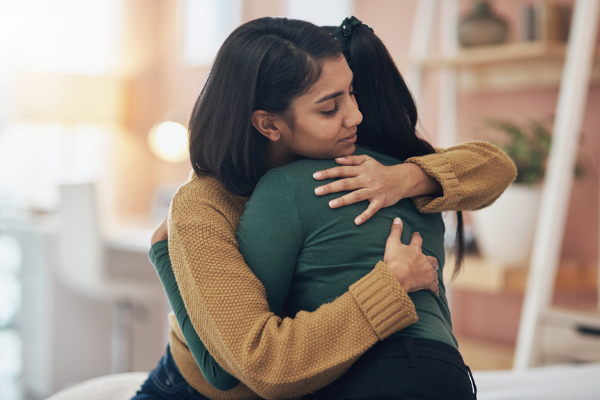
Psychotherapists co-regulate for a living – their speech, usually slow and soft, their body language open and the fact that a client has their undivided attention – all set the scene for co-regulation to take place.
We cannot be expected to fulfil the role of therapist to our friends and most of us do not have the expertise, but when the moment demands an immediate intervention, we want to be present in a way that allows our nervous system to bring calm to a loved one in distress.
How to be of comfort
Caroline Leaf recommends these steps to become a better co-regulator. This behaviour will allow you to be a calming, supportive infl uence and help others manage stress.
Understanding co-regulation can not only help you be present and supportive to a loved one in distress, it is also a reminder that your own state of mind can often benefit from reaching out to another. When you get caught in a vicious cycle of thoughts, or feel upset beyond the point of being able to rationalise, the science says that turning to someone you trust can bring you back to a place of control. We are pack animals and our emotions can turn toxic without connection and the calming intervention of a trusted confidante.
Words: Emma Cooling
Photographs: Getty Images
